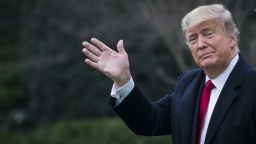Trump Organization Controller Jeffrey McConney testified about the mechanics behind him tacking on fringe benefits to salaries and bonuses at the direction of high-level executives, as the company’s criminal trial in New York resumed on Thursday.
McConney reiterated he followed instructions from former Chief Financial Officer Allen Weisselberg and other high-level Trump Org. executives to tack on fringe benefits to their salaries in bonuses that were ultimately not reported to tax authorities.
McConney also cut bonus checks via 1099 tax forms meant for independent contractors – a method that does not withhold taxes on the employer’s end. Those employees then did not report those bonuses as income on their personal taxes, so they took the money tax-free over several years, he confirmed.
The treatment also allowed the Trump Corporation to not pay payroll or Medicare taxes on the amount of the bonuses, the controller confirmed when asked on the stand.
In addition to the former CFO of Trump Org., Allen Weisselberg’s son Barry and his wife lived for years at a property on Central Park paying monthly rent of $1,000 – well under market value for the location – and part of that amount was covered by the company as a fringe benefit without reporting it to tax authorities, McConney testified.
Trump Org. Chief Operations Officer Matthew Calamari Sr. similarly received a bonus as an independent contractor and fringe benefits including car leases for himself and his wife and $72,000 in annual rent for a Park Avenue apartment that was ultimately not reported to tax authorities, McConney said.
Calamari’s son who also works at the company got certain benefits – his rent at the Central Park South building in New York City was treated as a fringe benefit and records show his father paid at least $130,000 for his apartment renovation through the company without paying taxes on it.
McConney testified that Trump Org.’s tax consultant from Mazars, Donald Bender, never told him the practices of underreporting taxable income were illegal.
But he acknowledged that Bender told him that he “wasn’t a fan” of the practice of issuing bonuses using 1099 tax forms when they could be booked as part of annual compensation from the Trump Corporation and taxed using a W2 tax form.
Around 2011, Bender advised McConney to stop cutting a bonus check to an in-house lawyer at the company because they could lose their law license for receiving it as an independent contractor, but McConney testified that he never questioned whether the illegality of how they handled bonuses would apply to anyone else.
Bender has not been charged with any wrongdoing. He has not responded to multiple requests for comment.
McConney also admitted that he filed tax forms for Weisselberg, Calamari and others improperly reporting to tax authorities that they did not keep residences in New York City, leading them to evade city taxes.
The Trump Org. controller acknowledged that he and other accounting personnel at Trump Org stopped these internal accounting practices in 2017 around the time that a tax consultant conducted an internal review for Trump Org. and President Donald Trump took office.
The jury also saw accounting ledgers for Donald Trump that McConney said appeared to have been doctored, however he couldn’t recall if he had made the changes.
A ledger turned over as evidence by Mazars showed no record of line items with notations that mention Weisselberg.
The ledgers obtained by prosecutors in 2021 directly from Trump Org. in this case show several line items on Donald Trump’s personal ledger with things like tuition for Weisselberg’s grandchilden notated “for Allen.”
The trial will resume on Monday.
CNN’s Kara Scannell contributed to this report.



